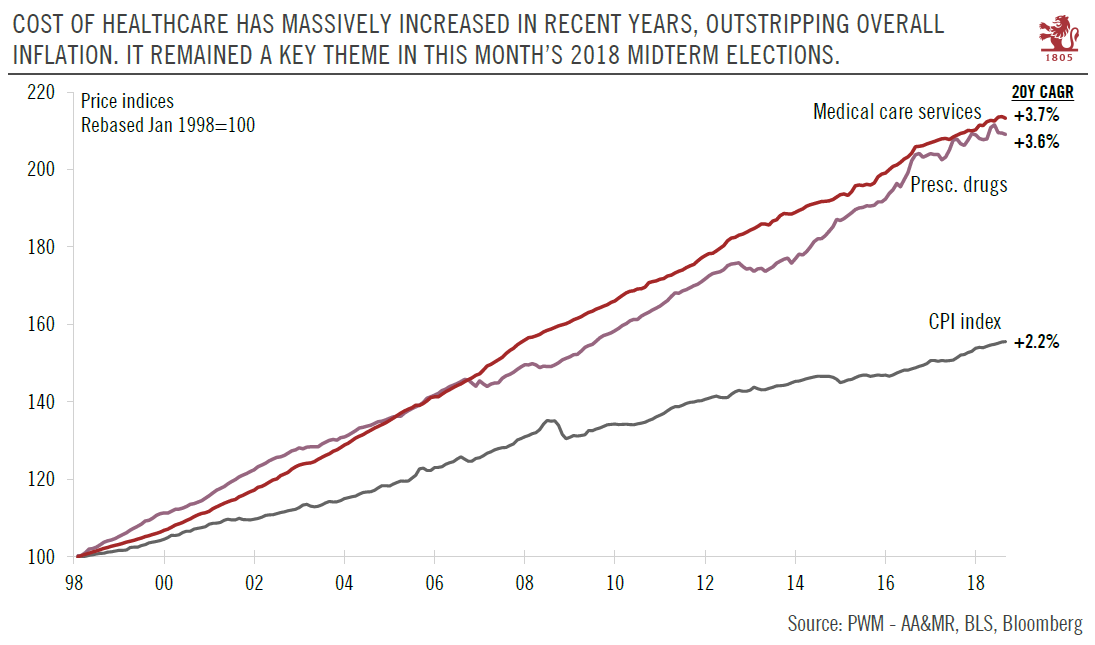More political scrutiny of drug and treatment prices is likely following the midterm elections.Healthcare policy was a key theme in the midterm elections and it seems that Democrats capitalised on this popular anxiety better than Republicans (they gained enough seats in the House of Representatives to secure a majority). Indeed, one of President Trump’s key failures over the past two years has been around healthcare policy. The Congressional vote to partly repeal Obama’s healthcare reform failed – also because Republican Senator John McCain, who had a pivotal vote, prominently rejected the bill, and the Republican party is unclear about what to do next on healthcare. Plans are quite sketchy at this stage.According to CNN data, healthcare was cited as the ‘most important issue facing the
Topics:
Thomas Costerg considers the following as important: healthcare, Macroview, US politics
This could be interesting, too:
Cesar Perez Ruiz writes Weekly View – Big Splits
Cesar Perez Ruiz writes Weekly View – Central Bank Halloween
Cesar Perez Ruiz writes Weekly View – Widening bottlenecks
Cesar Perez Ruiz writes Weekly View – Debt ceiling deadline postponed
More political scrutiny of drug and treatment prices is likely following the midterm elections.
Healthcare policy was a key theme in the midterm elections and it seems that Democrats capitalised on this popular anxiety better than Republicans (they gained enough seats in the House of Representatives to secure a majority). Indeed, one of President Trump’s key failures over the past two years has been around healthcare policy. The Congressional vote to partly repeal Obama’s healthcare reform failed – also because Republican Senator John McCain, who had a pivotal vote, prominently rejected the bill, and the Republican party is unclear about what to do next on healthcare. Plans are quite sketchy at this stage.
According to CNN data, healthcare was cited as the ‘most important issue facing the country’ by 75% of Democrats, versus 23% for Republicans (immigration was cited, inversely, by 75% of Republican voters, and 23% of Democrats).
This ongoing popular anxiety is not only attributed to the ageing of the US population, which tends to be associated with a rise in healthcare spending, but also because healthcare costs have ballooned in recent years. This can be seen in inflation indices (see Chart): over the past two decades, the cost of medical care services has grown by 3.7% per annum, compared with 2.2% per annum for overall consumer price inflation. Prescription drugs have grown at +3.6% p.a.
There are some potential good news lately on the healthcare price front – although it does not seem to have reached voters yet. Both categories have tended to slow in recent months. Over the period of January-September 2018, while the CPI inflation index was up 2.5% y-o-y, on average, medical care services were up 2.1% on average, while prescription drugs were up also 2.1% – so both underperformed the CPI index lately.
It remains to be seen how the Pelosi-Trump duo will evolve post-midterms, and more importantly, how effectively they plan to keep drug prices under control for good. For now, it seems that the Obama reform may have started to produce some cooling effects on healthcare costs. However, there is still high uncertainty around the outlook for healthcare prices, and since healthcare costs are also a key input to overall US inflation (and one reason why inflation has been relatively modest lately despite the strong labour market), this also means that there remains a large degree of uncertainty over the outlook for US inflation. Macroeconomic drivers like the tight labour market could be offset by such microeconomic drivers as healthcare policy.

